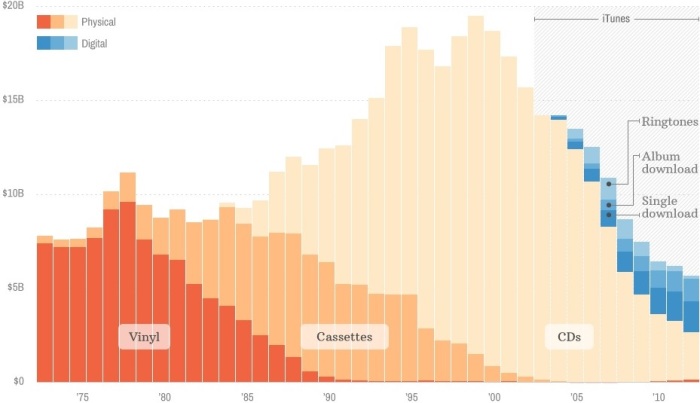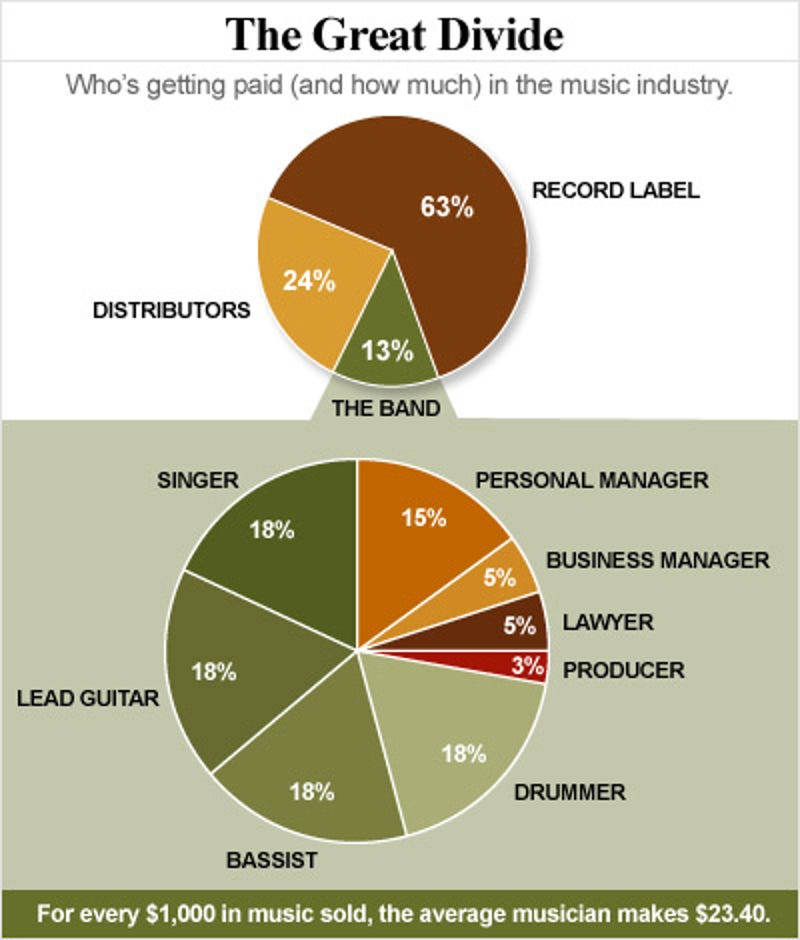Do you ever think on the differences between huge mainstream music artists and niche music artists? That some artists who are well recognised get the fame and live in a more lavish lifestyle; whereas those who aren’t recognised may be struggling to even pay their rent?
Personally, I never thought about my favourite artists and if they live in decent lifestyles. That was barely in mind when I was into music, barely even when I downloaded a lot of songs off the internet. I had thousands of songs that were on my SD card in my phone, that way I can listen to music at any time. I had a care about the art but not the artists, sounds messed up, I know…
But recently I got into the vinyl craze, which is where audiophiles (people who are into music for their quality and soundscapes) and trend-lovers purchase records that now being mass produced for the first time since the 1990s.

This statistic is referencing in how vinyl as a medium is making an increase of sales, for some its been a hobby – for others it is a trend; but nonetheless it is a way of supporting artists from sales.
I have been interesting in purchasing records for a few reasons, one, was that I wanted to start a hobby of mine in collecting items that would be a personal treasure and connectivity – it gets me feeling productive and in content with the few physical copies that I have. And two, when purchasing records from my favourite artists is to support them and in giving them their profits – or in a technical sense, ‘royalties’.

When the massive increase of internet use and legal loopholes that comes to downloading content from the internet, music downloading has become one of the biggest issues for music labels. Although downloading content from free in certain peer-to-peer sites is considered illegal as it is a copyright infringement, its also a way that the labels and artists in not receiving their profits. But it more affects the artists – who put their efforts in creating the music in mere passion and in sharing it to their audiences.

(DISCLAIMER: while this graph may give a general accuracy on the distribution on royalty, I personally would not take this graph as the exact truth. Distribution can come in different percentages by label.)
Labels have been suffering in achieving sales recently so theyve been thinking of ways on sustaining itself to keep up as labels [1] [2]. Record companies always had free range on what they do in achieving their profits, especially during this time – where physical and digital sales are now being affected. But its not to say that record companies have been ‘saints’ or had assisted artists financially to their full potential.
For the artists (specifically upcoming artists) – it is a game, a strategy, and/or a lottery in how their music will reach audiences and record labels. When gaining recognition they try to see if they can receive money for their work – no matter how little. There has been stories, rumours, films made about the struggles of being recognised or being in the industry where you might not be truly popular or don’t receive enough money from sales and promotions.
Theatrical trailer for Inside Llewyn Davis (The Coen Brothers, 2013), a folk artists trying to survive being a musician in New York City during the 1960’s.
Theatrical trailer for Control (Anton Corbijn, 2007), a biopic film on the band Joy Division and the start of the music recognition of the Manchester scene in 1970’s UK.
For Rock artists, they lived together, either in hotel rooms, cars, vans, homes and lived to put up with each other. Difficulty start if one’s self have to gain popularity and wealth from the artistic work. There is a band that I know called Sir Lord Baltimore, who were the first to be called Heavy Metal, and at the very start of the 70’s there were huge acts such as Jimi Hendrix, Led Zeppelin, and Black Sabbath – those mentioned artists were either extremely popular and were likely on huge records; or were gaining traction from their increasing fan-base. But in the case of Sir Lord Baltimore, a band from New York City, were not as popular, not were on a big label, and during their time as musicians barely received their royalties for their albums. For the band being influential in the Heavy Metal and Stoner Rock scene (yes, they sounded pretty psychedelic but distorted), never having such credit where it is due is disheartening, yet they weren’t the only ones.
-KS